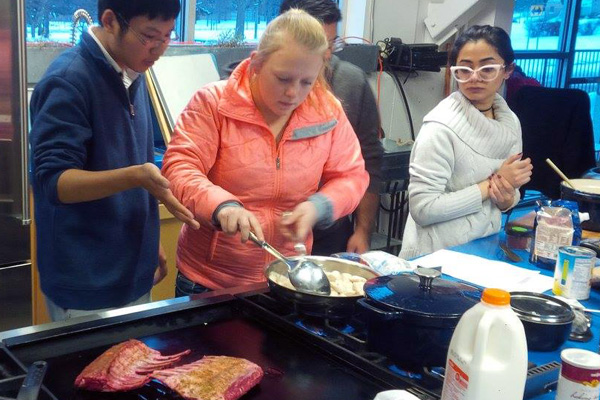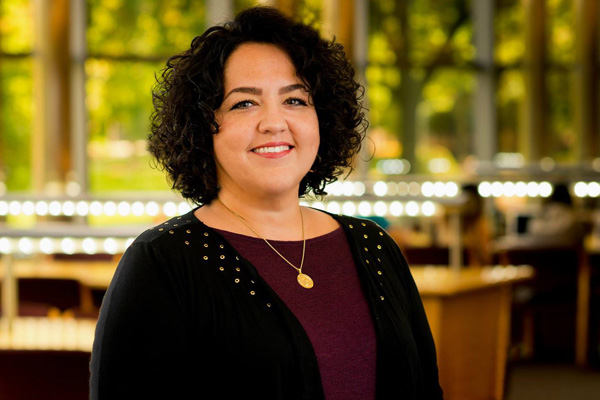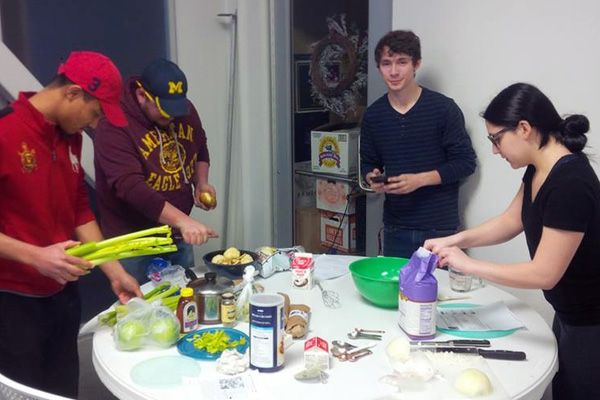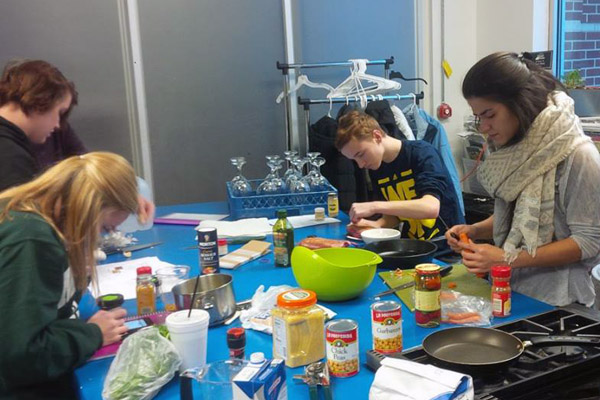UM-Flint Course Creates 'Bridge' for New, International Students

Each semester, UM-Flint welcomes a wide variety of new students to campus. Their first semester is especially important as they acclimate to life as a college student and learn what it means to be a part of the University of Michigan. To help, designated courses are available that recognize and celebrate the transition.
Faculty members from the College of Arts and Sciences' Biology Department and Anthropology program developed one such course that focuses on food and culture. It also serves to introduce first-year students to the ideas of interdisciplinary study and critical thinking. Additionally, the course has become a part of the university's Bridge Program—a program that connects international students to U.S. academic culture while developing English language skills.
"This course is a wonderful example of the ways in which our College faculty approach educating students," said Susan Gano-Phillips, PhD, Dean of the College of Arts and Sciences (CAS). "We strive to provide courses with relevant topics that establish and build the liberal arts foundation we know will help students while enrolled at UM-Flint and for the rest of their lives. We can all think more deeply about our world, ask questions, and consider the perspectives of others. A food and culture course is a natural way to begin such conversations."
The course has not only led to meaningful learning for UM-Flint students, both domestic and international, it has also left a strong impression on the faculty members who have taught it.

Tracy Wacker, emeritus lecturer of biology and current Director of the Thompson Center for Learning & Teaching, was involved in the original course design. "Learning about food and its relevance in cultural traditions, its societal and agricultural impacts, including local/global food issues, is important for any citizen," noted Wacker. "I hoped that introducing these topics to first-year students would instill a sense of community and citizenship in them. I believe that having representation from both international and domestic students in the course was essential to its success."
Teaching Food and Culture at UM-Flint
In Fall 2016, Stephanie Gelderloos of UM-Flint English co-taught the course with Wacker. Gelderloos is also an integral part of the Bridge Program. "Over the past year or so, the Bridge Program director and I have discussed the need for a class designed to help integrate international students into American academic culture more quickly," noted Gelderloos. "We decided that the Food and Culture course would address that need."

"At the same time, the course aimed to benefit domestic students as well," she continued. "Domestic students having meaningful interaction with international students helps broaden their cultural understanding and knowledge; this is especially beneficial to those whose career plans will lead to regular contact with our multicultural public, like teachers or doctors."
The semester's coursework was centered on group projects. Groups were assigned and rotated to ensure class members worked with a variety of partners. This model allowed for more meaningful interaction and opportunities for conversation. "For example, when the students were put into groups and asked to share some foods that are tied to specific holidays in their culture, the answers were varied," said Gelderloos. "The international students, from Germany, China, India, and Saudi Arabia, learned about American traditions while American students learned about their foods and holidays."
The class culminated with a very unique final exam. The students divided into five teams and were tasked with researching, preparing, and serving a meal related to a specific culture—one not represented by the group's members.

It was the final exam that was especially meaningful for both instructors. "The students were so proud of themselves," said Gelderloos. "They had worked together to research the culture, plan a meal, create a menu, and then cook it together and serve it to their classmates while they taught them about the culture the foods came from. It was the ultimate in collaboration. This is the power of teamwork!"
Final exam cultures included Jamaica, Korea, Sweden, Morocco, and the Philippines. Shopping, prep work, and cooking took place at the Flint Farmers' Market, just next door to the UM-Flint campus.
The UM-Flint Student Experience
Gelderloos shared many of the learning experiences with her students, as it was her first time teaching the course. When asked what surprised her, she replied, "How little we know about where our food comes from and what processes it goes through before it gets to our table. I was also surprised at the origins of some of the foods used in what are considered the traditional cuisines of some cultures. Our food supply is global and has been for a long time!"
The students echoed her sentiments about the course content. Yifan Wang, an Economics student in CAS, was excited about the lesson on city/urban farms. "This kind of project improves community relationships and offers an awareness of agriculture and farming to people who live in built-up areas," Wang noted. "It not only provides an opportunity to people who want to experience farms, but also to decorate the appearance of a city, which makes the whole city more spirited."

Wang, who was on the team cooking Jamaican food for the final, also commented on the lessons learned from group work: "This whole experience was meaningful to me because it gave me practice in teamwork skills, like negotiating the distribution of duties. And I learned how to communicate with my team members more effectively."
"This class makes students more aware of the world around them, then makes them eager to improve their world," reflected Business student K. Korth. "It's very easy for college students to forego traveling, so classes such as this one allow students to submerse themselves into a culture they would otherwise never see. Teaching students to become more responsive to culture will allow them to improve themselves as a whole versus the typical educational growth most students are accustomed to."
School of Education and Human Services student Michelle Stojanovski said, "This type of class is important because I learned about categories food falls under; I better understand the Flint community; and I was able to share my food traditions with my professors and classmates as I learned about theirs. All of these things allowed me to look outside of the box, interact with others, and expand my knowledge on many different areas."
Looking forward, Gelderloos hopes more students will give courses like Food and Culture a try. As a note to those students interested in her course, said Gelderloos, "You have to get permission to register, but don't let that stop you. It is just a way to save room for international students who enroll in classes later. Just email me, and if there's room, you're in!"
Stephanie Gelderloos can be reached at stepgeld@umflint.edu.
- Anthropology
- Biology
- College of Arts, Sciences & Education
- Economics
- English
- International
- School of Management
- University News
UM-Flint News
The Office of Marketing & Communications can be reached at mac-flint@umich.edu.

